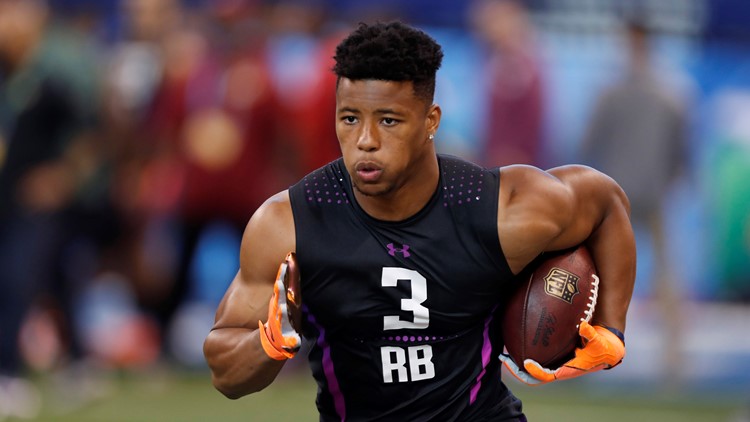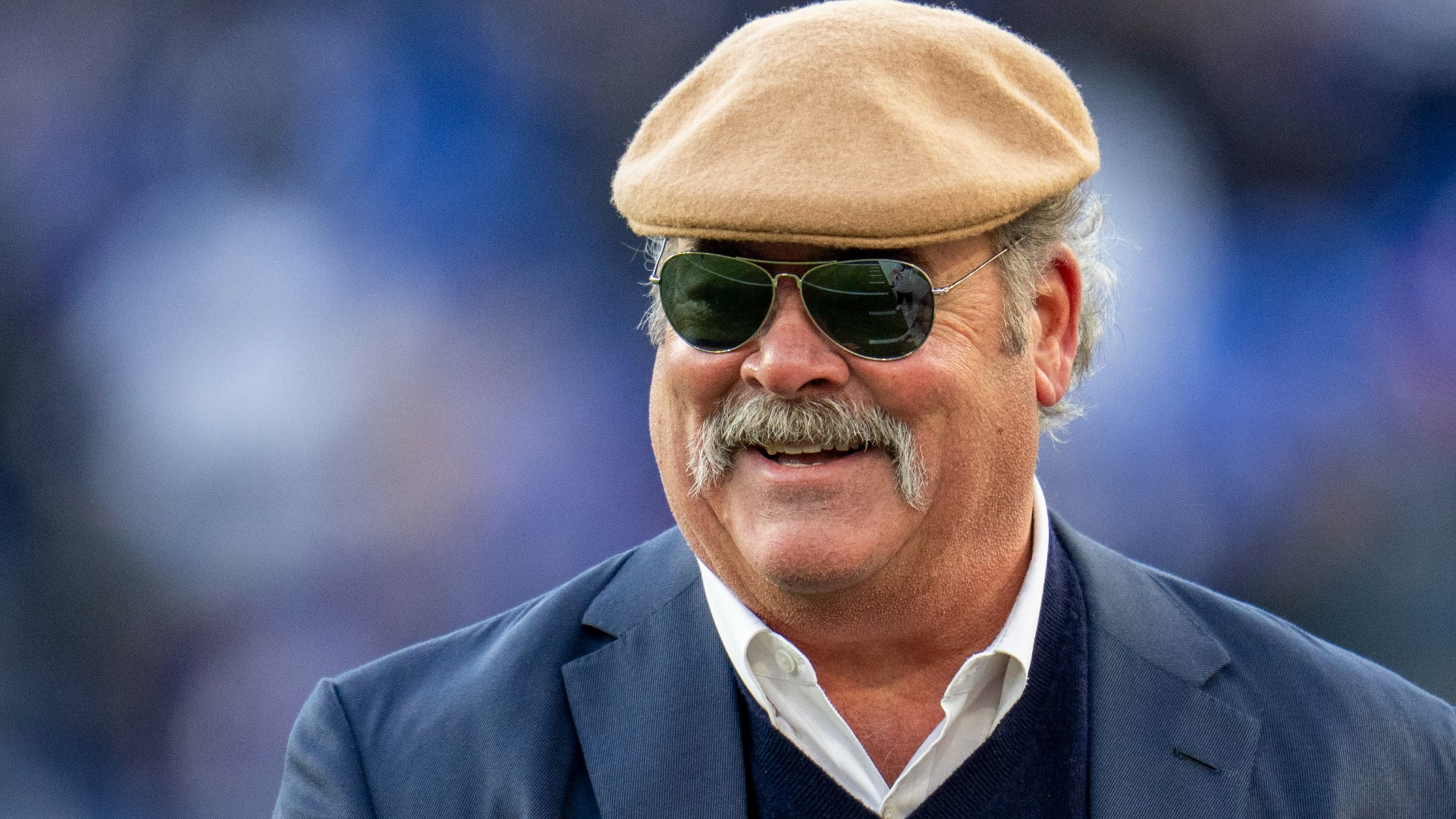The 2018 NFL draft kicks off Thursday night. But after months of study, USA TODAY Sports' hay is in the barn. Here is Michael Middlehurst-Schwartz's ranking of the top 40 prospects available:
1. Saquon Barkley, RB, Penn State: Speed, power, elusiveness, instincts and pass-catching ability make him the complete package. It's rare for a running back to earn widespread consideration as the best overall prospect in any draft, but Barkley's complete skill set is something seldom seen.
2. Quenton Nelson, G, Notre Dame: With overwhelming power and nimble feet, he might be a generational prospect, albeit at a position that could limit his value relative to the rest of the top 10 picks. Nelson is one of the draft's best bets to be a long-term standout.
3. Josh Rosen, QB, UCLA: The most polished of all the passers available, he offers the refined mechanics and quick processing needed to be a distributor at the center of an offense. So long as Rosen develops a better feel for pressure and cuts down on forced throws, he should have no trouble consistently picking apart defenses in the short-to-intermediate area that now largely defines most passing attacks.
4. Roquan Smith, LB, Georgia: When he's on the field, Smith stands a good chance to be the first defender to find the ball on a given play. Displaying range both as a tackler and in coverage, he aces nearly every test for an off-ball linebacker.
5. Derwin James, S, Florida State: Whether he's working in coverage, at the line of scrimmage or as a blitzer, James is a lightning strike capable of short-circuiting any offense. Assuming he settles down a bit as a tackler, he should be a do-everything leader in the secondary.
6. Bradley Chubb, DE North Carolina State: Stouter and more polished than most pass rushers at this stage, Chubb doesn't bring the elite speed off the edge typically seen from top-10 picks. Yet there's little questioning his ability to close out on opponents in the backfield thanks to his acceleration, strength and hand usage.
7. Sam Darnold, QB, Southern California: Very nearly the total package, he has perhaps the best combination of easy athleticism and leadership of any passer. Lapses with his footwork and a penchant for turnovers (22 last season) need to be addressed. But his ability to throw comfortably to every level of the field, as well as extend and create plays on his own, makes him a rare prospect.
8. Denzel Ward, CB, Ohio State: Fluid athleticism and a well-rounded skill set should help him follow in the steps of 2017 defensive rookie of the year Marshon Lattimore and the Buckeyes' other recent first-round defensive backs. Matching up with taller receivers could prove troublesome, but Ward has shown he can win with the ball in the air.
9. Minkah Fitzpatrick, S, Alabama: If he strictly operated as an outside corner, he might be a consensus pick as the top defensive prospect in the draft. But with a proven track record working in the slot as well as at safety and outside linebacker, he projects as a versatile leader who will be at ease with an assortment of coverage responsibilities.
10. Baker Mayfield, QB, Oklahoma: The Heisman Trophy winner is hardly the prototype of an NFL passer at just over 6-0 and 215 pounds. But his rapid-fire delivery and prowess throwing into tight windows elevate him to a level other quarterbacks of comparable statures have struggled to reach. Though Mayfield thrives operating outside of an offense's structure, he must calm some of the more frenetic elements of his playing style.
11. Calvin Ridley, WR, Alabama: In a muddled receiver class, his deep speed and comfort creating his own separation leave him as the top pass-catching weapon available. Consistently beating press coverage will be his foremost challenge at the next level.
12. Tremaine Edmunds, LB, Virginia Tech: At 6-5 and 253 pounds with explosive speed, he might have the highest ceiling of any defender in this draft. If Edmunds can hone his instincts to keep ball carriers in front of him, he will be a hazard either whether working in the middle or off the edge.
13. DJ Moore, WR, Maryland: Finally getting his due over the last few months, he's become one of the draft's biggest post-combine risers. With breakaway speed and impressive toughness for his size, Moore should make life hard on opposing corners.
14. Harold Landry, DE/OLB, Boston College: A quick burst and acrobatic bend make him difficult to handle off the edge, and he has more than enough ways to take advantage of an off-balance blocker. Don't expect Landry to anchor against the run, though.
15. Josh Jackson, CB, Iowa: The Football Bowl Subdivision leader with eight interceptions still has plenty of room to develop given that he has just one year of experience as a starter.
16. Jaire Alexander, CB, Louisville: Overshadowed after an injury-plagued season, he has since reaffirmed that he is both smooth and aggressive, with the ability to contribute early whether outside or in the slot.
17. Isaiah Wynn, G, Georgia: If he were taller than 6-2 with more wingspan, he would be a lock as a top-20 selection. Even at guard, Wynn's comfort in both mirroring pass rushers and paving holes in the run game should make him a high-end starter.
18. Derrius Guice, RB, LSU: Issuing a warning to any team that might pass on him, Guice said, "If you don't draft me, I'm going to give your defense hell." That's an apt characterization of his rugged running style, which could be problematic for his opponents if he stays healthy (or himself if he doesn't).
19. Sony Michel, RB, Georgia: The shiftiness and acceleration are reminiscent of reigning offensive rookie of the year Alvin Kamara, and the fellow Southeastern Conference standout could carve out a similar all-purpose role if he resolves some issues with his patience and ball security.
20. Maurice Hurst, DT, Michigan: His initial burst and ability to fire through gaps are unmatched among interior defenders in this class. With his heart condition cleared, he could become the latest undersized defensive tackle to become a disruptive force.
21. Marcus Davenport, DE, Texas-San Antonio: Pairing a lengthy (6-6, 264 pounds) frame with impressive speed, Davenport has the tools to be a terror off the edge. A slow build-up out of his stance and underdeveloped feel for pass rushing, however, could diminish the early returns on that athleticism.
22. Lamar Jackson, QB, Louisville: The playmaking ability is impossible to ignore. Now it's up to Jackson and his future team to figure out how to harness his talent as both a runner and thrower while cleaning up his footwork and continuing to bring him along as a pocket passer.
23. Will Hernandez, G, Texas-El Paso: A mauler in the run game, he is a throwback (check the neck roll) who should set the right tone for almost any line.
24. Rashaan Evans, LB, Alabama: He'll make his living working sideline to sideline in coverage, though he should also be an asset on blitzes.
25. Da'Ron Payne, DT, Alabama: Commanding double teams and anchoring at the point of attack is his game, though coaches will demand better leverage.
26. Vita Vea, DT, Washington: As a run stuffer, he is already operating at a pro level. But he runs the risk of topping out as a two-down space eater if he can't translate his impressive movement ability into a more consistent game plan as a pass rusher.
27. Mike McGlinchey, OT, Notre Dame: Struggles with speed rushers could yield some early turbulence in the NFL, but McGlinchey brings a strong punch as the best overall offering at tackle.
28. Taven Bryan, DT, Florida: "The Wyoming Wild Man" either will be a defensive line coach's dream or disappointment, as he oscillates between dispatching opposing linemen and taking himself out of plays with his overly aggressive tendencies.
29. James Daniels, C, Iowa: Flexible and fluid on the move, he shapes up to be the top center in this class with lots of room for growth.
30. Leighton Vander Esch, LB, Boise State: Still learning to tap into his considerable physical skills after only one year as a starter, Vander Esch should only grow more comfortable both in pursuit and coverage over time.
31. Connor Williams, G/OT, Texas: He might not end up the franchise left tackle some expected him to be, but teams won't have trouble finding a place for one of the draft's best technicians.
32. Anthony Miller, WR, Memphis: More than a slot maven, Miller will make life easy for any quarterback with his giant catch radius and outstanding body control.
33. Isaiah Oliver, CB, Colorado: His physical traits point toward a No. 1 cornerback who can thrive in press coverage, though his technique will require refinement.
34. Justin Reid, S, Stanford: With experience playing an assortment of roles, he has the savvy and skill set to be the versatile piece defensive coordinators crave in the secondary.
35. Mike Hughes, CB, Central Florida: His toughness and physical style should make him a pest for opposing receivers, so long as he lands in a scheme heavy on man coverage.
36. Nick Chubb, RB, Georgia: Lacking the same explosive fluidity as Georgia backfield mate Michel, Chubb nevertheless demonstrates the know-how needed to be consistently effective in tight quarters.
37. Billy Price, C, Ohio State: A pectoral injury at the combine pushed him off the radar a bit. But Price's strength, sound approach and leadership will keep him in high demand.
38. Ronald Jones, RB, Southern California: "The Texas Tesla" is a breakaway threat, though he'll have to learn not to floor it on every carry as his blocks develop.
39. Mike Gesicki, TE, Penn State: In a league driven by creating mismatches, the former volleyball and basketball standout will be an imposing target on jump balls and in the red zone.
40. Dallas Goedert, TE, South Dakota State: It might take time to learn how to separate from NFL defenders consistently, but he has the speed and body control to become a dependable downfield threat.
Next tier: Mason Rudolph, QB, Oklahoma State; Josh Allen, QB, Wyoming (see our explanation for why he didn't make the top 40); Hayden Hurst, TE, South Carolina; Austin Corbett, G, Nevada; Harrison Phillips, DT, Stanford;
***
Follow Michael Middlehurst-Schwartz on Twitter @MikeMSchwartz



